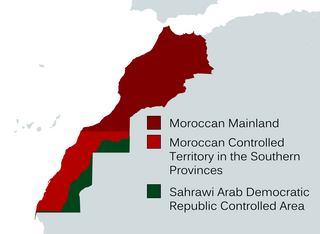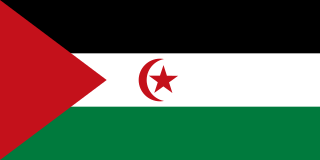
The politics of Western Sahara take place in a framework of an area claimed by both the partially recognized Sahrawi Arab Democratic Republic and Morocco.

The Polisario Front, Frente Polisario, Frelisario or simply Polisario, is a rebel Sahrawi nationalist liberation movement claiming Western Sahara.

Spanish Sahara, officially the Spanish Possessions in the Sahara from 1884 to 1958, then Province of the Sahara between 1958 and 1976, was the name used for the modern territory of Western Sahara when it was occupied and ruled by Spain between 1884 and 1976. It had been one of the most recent acquisitions, as well as one of the last remaining holdings, of the Spanish Empire, which had once extended from the Americas to the Spanish East Indies.

Elections in the Sahrawi Arab Democratic Republic are regularly held by the government-in-exile at a national, regional and local level. Elections are considered to be held under a non-partisan participatory democratic regime, as the Sahrawi Arab Democratic Republic (SADR) and the Polisario Front structures are parallel.

Río de Oro was, with Saguia el-Hamra, one of the two territories that formed the Spanish province of Spanish Sahara after 1969; it had been taken as a Spanish colonial possession in the late 19th century. Its name seems to come from an east–west river which was supposed to have run through it. The river was thought to have largely dried out – a wadi, as the name indicates – or have disappeared underground.

The Southern Provinces or Moroccan Sahara are the terms utilized by the Moroccan government to refer to the disputed territory of Western Sahara. These designations encompass the entirety of Western Sahara, which spans three of Morocco's 12 top-level administrative regions. The term "Southern Provinces" frequently appears in Moroccan state television.

Scouting exists in Western Sahara both as part of the Fédération Nationale du Scoutisme Marocain as well as independent groups.

Sahrawi Youth Union, also known as UJSARIO, is the youth organization of the Polisario Front.

Sahrawi Trade Union, also known as UGTSARIO, is the labor organization of the Polisario Front.

Tiris al-Gharbiyya was the name for the area of Western Sahara under Mauritanian control between 1975 and 1979.

The politics of the Sahrawi Arab Democratic Republic refers to politics of the Polisario Front's proclaimed Sahrawi Arab Democratic Republic, a country in North Africa with limited recognition by other states, controlling parts of the Western Sahara region.

The Western Sahara War was an armed struggle between the Sahrawi indigenous Polisario Front and Morocco from 1975 to 1991, being the most significant phase of the Western Sahara conflict. The conflict erupted after the withdrawal of Spain from the Spanish Sahara in accordance with the Madrid Accords, by which it transferred administrative control of the territory to Morocco and Mauritania, but not sovereignty. In late 1975, the Moroccan government organized the Green March of some 350,000 Moroccan citizens, escorted by around 20,000 troops, who entered Western Sahara, trying to establish a Moroccan presence. While at first met with just minor resistance by the Polisario Front, Morocco later engaged a long period of guerrilla warfare with the Sahrawi nationalists. During the late 1970s, the Polisario Front, desiring to establish an independent state in the territory, attempted to fight both Mauritania and Morocco. In 1979, Mauritania withdrew from the conflict after signing a peace treaty with the Polisario Front. The war continued in low intensity throughout the 1980s, though Morocco made several attempts to take the upper hand in 1989–1991. A cease-fire agreement was finally reached between the Polisario Front and Morocco in September 1991. Some sources put the final death toll between 10,000 and 20,000 people.

Mohamed-Fadel Ould Ismail Ould Es-Sweyih was a Sahrawi nationalist politician, member of the Polisario Front. He was a prominent member of the Sahrawi Arab Democratic Republic diplomatic corps, holding several posts as SADR ambassador or Polisario Front representative.

Brahim Ghali is a Sahrawi politician, military officer and current president of the Sahrawi Arab Democratic Republic (SADR), formerly its ambassador to Algeria and Spain.

Sahrawi nationalism is a political ideology that seeks self-determination of the Sahrawi people, the indigenous population of Western Sahara. It has historically been represented by the Polisario Front. It came as a reaction against Spanish colonialist policies imposed from 1958 on, and subsequently in reaction to the Mauritanian and Moroccan invasions of 1975.

Sahrawi Arab Democratic Republic–Spain relations are the current and historical relations between the Sahrawi Arab Democratic Republic and Spain.

The Morocco–Western Sahara border is 444 kilometres (276 mi) in length and runs from Atlantic Ocean in the west, to the tripoint with Algeria in the east. The border has existed purely in a de jure sense since Morocco's annexation of Western Sahara in 1976–1979.

The Algeria–Western Sahara border is 41 kilometres (25 mi) in length and runs from the tripoint with Morocco in the north to the tripoint with Mauritania in the south.

The 16th Congress of the Popular Front for the Liberation of Saguia El Hamra and Río de Oro was held in the Dajla refugee camp in Tindouf, Algeria between 13 and 22 January 2023 to renovate the governing bodies of the Polisario Front and establish the movement's main lines of action and strategy for the next leadership term.

The 13th Congress of the Popular Front for the Liberation of Saguia El Hamra and Río de Oro was held in Tifariti between 15 and 22 December 2011 to renovate the governing bodies of the Polisario Front and establish the movement's main lines of action and strategy for the next leadership term.

















